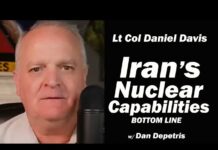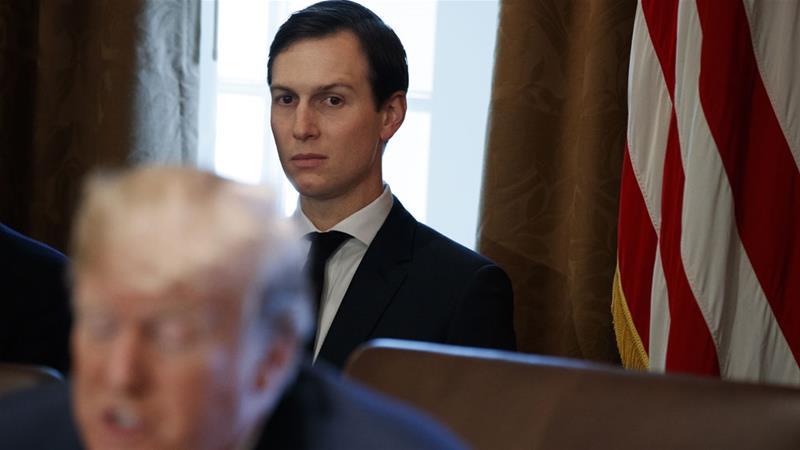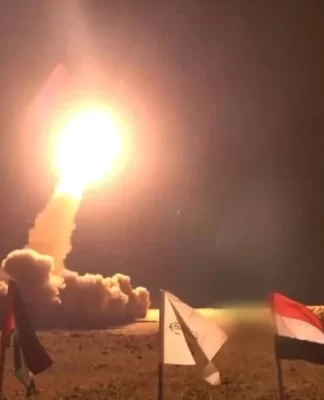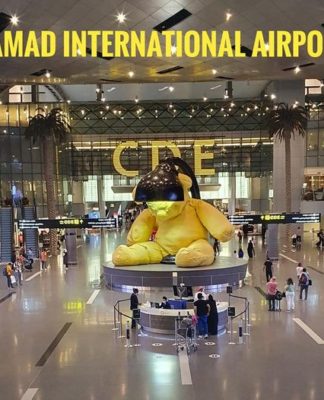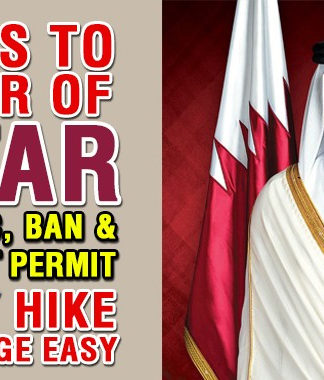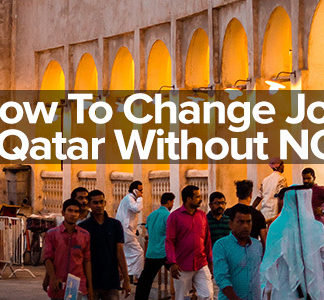As White House team visits region, what hope is there for unannounced US plan pre-emptively rejected by Palestinians?
![Can US plan for Middle East deliver peace? Kushner, Trump's son-in-law and senior adviser, has been tasked to revive the stalled peace process [File: Evan Vucci/The Associated Press]](https://www.aljazeera.com/mritems/imagecache/mbdxxlarge/mritems/Images/2018/6/21/3327b49878fe4aa7a77bba32269f50c8_18.jpg)
The latest tour by US officials to the Middle East aims to build up support for Washington’s yet-to-be-announced plan for Israeli-Palestinian peace, much of which remains shrouded in secrecy.
Jared Kushner, US President Donald Trump’s son-in-law and top aide who was tasked last year with reviving the stalled peace process, and Middle East Envoy Jason Greenblatt arrived in Jordan on Tuesday as part of a regional tour that also includes stops in Egypt, Saudi Arabia, Qatar and Israel.
Yet, with the US administration keeping mum until now about their plan and offering no details, questions are being raised about what Trump has dubbed the deal of the century.
“I find it difficult to believe that their purported initiative has been under development for more than a year while nothing substantial has leaked about it,” Mouin Rabbani, a Middle East analyst, told Al Jazeera.
“In other words, there is no plan.”
Israeli policy over peace
More than two decades of negotiations between the Palestinian Authority (PA) and Israel broke down in 2014.
Previous US administrations oversaw the peace process between the two sides based on the two-state solution, which sees a Palestinian state established within the June 4, 1967 borders with East Jerusalem as its capital.
After the US decision in December 2017 to recognise Jerusalem as Israel’s capital – breaking with international consensus that the city is occupied territory – the PA declared Washington unfit to act as mediator.
As a result, the Palestinians cut off talks with the Trump administration, which in January also slashed by more than half its planned funding to the United Nations agency for Palestinian refugees (UNRWA).
Furthermore, Greenblatt and Kushner’s personal and financial ties to Israel – including their links to the donation of vast sums of money to illegal settlements in the occupied territory – has led the PA to pre-emptively reject the peace plan.
“If one looks at the recognition of Israeli sovereignty over Jerusalem, the campaign to eliminate UNRWA, the current US approach is one of implementing Israeli policy vis-a-vis the Palestinians, and perhaps at some later date presenting an initiative that seeks to formalise these achievements,” Rabbani said.
What is the role of Arab leaders?
After their separate meetings with Kushner and Greenblatt, Jordan’s King Abdullah II and Egyptian President Abdel-Fattah el-Sisi, as well as Saudi Crown Prince Mohammed bin Salman, have all reiterated their support for breaking the deadlock in the peace process and for greater cooperation with the US.
There was also general agreement on the need to facilitate humanitarian relief to the Gaza Strip, whose economy has been crippled by an Israeli-Egyptian blockade.
Last week, Israeli daily Haaretz reported that the US is attempting to convince the Arab Gulf states to invest up to $1bn in projects in the coastal enclave for rehabilitation and security purposes.
Yet PA President Mahmoud Abbas issued a statement on Tuesday denouncing the plan as a divisive effort aimed at entrenching the political differences between the West Bankand the Hamas-run Gaza Strip even further.
“The Palestinian leadership warns the countries of the region against cooperating with a move whose goal is to perpetuate the separation between Gaza and the West Bank and lead to concessions on Jerusalem and the holy sites,” the statement said.
The Jerusalem conundrum
Jerusalem remains the main point of contention in the decades-long conflict.
“Without a state for the Palestinian people with Jerusalem as its capital, it will be impossible to achieve peace in our region,” Jordan’s King Abdullah II said on Thursday, in a meeting with German Chancellor Angela Merkel, who was on an official visit to the Hashemite kingdom.
The king’s remarks came days after meeting Israeli Prime Minister Benjamin Netanyahu, who travelled to Amman on Monday for a brief unannounced visit.
The two leaders discussed advancing the two-state solution as “the only way to achieve peace and stability in the region”, according to a statement after the meeting. Netanyahu also affirmed his desire to maintain the status quo of major holy sites in Jerusalem, which are under the official custodianship of Jordan.
Yet in light of the US moving its embassy from Tel Aviv to Jerusalem, and Trump dropping his country’s two-decades commitment to the establishment of a Palestinian state alongside Israel, the internationally-backed two-state solution seems to no longer be Washington’s desired framework for a permanent peace agreement.
At the same time, reports have said that the US has proposed that the West Bank suburb of Abu Dis would act as the Palestinian capital – much to the anger of Palestinians.
“What we can expect is a Palestinian state on provisional borders,” Meron Rapoport, an Israeli independent journalist, told Al Jazeera. “I don’t think they will be able to decide on the future of Jerusalem. It’s delicate.”
‘Non-starter’
Even though details of the plan have not been released, the so-called deal of the century so far looks like it will offer little in terms of a workable solution to the Israeli occupation.
“The PA, and the Palestinians more generally, are fundamentally irrelevant to American concerns except insofar as these may be required to enable closer and more formal ties between Israel and Arab states.”
“The Americans are counting on their Arab allies and clients to deliver the Palestinians, but this is easier said than done.”
While it is almost certain that the expected deal would be rejected by Palestinians across the political spectrum, the question, according to Rapoport, is whether the Israelis would consent to it.
“Although the deal sounds very pro-Israel, the majority in the government like Minister of Education Naftali Bennett are completely opposed to a Palestinian state,” he said.
“Maybe the only way to sell this would be to have some kind of Saudi recognition of Israel and having formal relations with it, in return for a provisional Palestinian state.”
While most Palestinians on the street regard the US as a dishonest broker at best, and Israel’s patron at worst, what is different in this case is that the PA – which traditionally has sought the backing of the US in return for maintaining their legitimacy – no longer has any excuses to prolong the facade of the peace process.
“The idea that there can be constructive engagement between this US administration and the Palestinians is a non-starter,” Rabbani said.
“This ‘peace team’ [Kushner and Greenblatt] has through its actions already managed to alienate and create a rupture with the most pliable, anaemic and, frankly, collaborationist Palestinian leadership since the 19th century.”
SOURCE: AL JAZEERA NEWS








